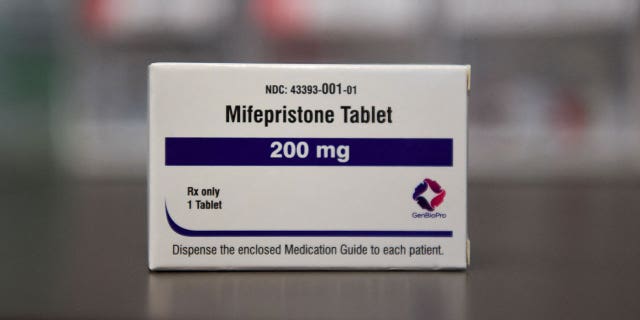The U.S. Justice Department is racing this week to convince a federal appeals court, or possibly the U.S. Supreme Court, to put on hold a judge’s order suspending the government’s approval of the abortion pill mifepristone, which is used in more than half of all abortions in the country.
But even if those legal efforts fail and last Friday’s order by U.S. District Judge Matthew Kacsmaryk in Amarillo, Texas goes into effect, essentially rendering the drug unapproved, the U.S. Food and Drug Administration could nonetheless continue to allow access to the drug, legal experts say.
The FDA, responsible for protecting public health by assuring safety, efficacy and security of drugs, is also facing an order issued minutes later on Friday by a separate federal judge in Washington state, barring the federal agency from changing the availability of mifepristone.
The contradictory rulings may give the FDA reason to preserve the status quo while the government’s appeal proceeds and declare that drug companies and doctors won’t face legal risks for making or prescribing mifepristone, experts said.
“One way in which the FDA could comply with this is to do nothing, to use its enforcement discretion to say we can’t satisfy both judgments,” said Rachel Rebouche, dean of the Temple University Beasley School of Law.
The FDA can demand that manufacturers remove unapproved drugs from the market and if a manufacturer fails to comply, the agency can take the drugmaker to court.
But the agency also has to make best use of its resources and has a history of not taking action when there is low risk to the public. The FDA has estimated that there are thousands of drug products marketed illegally without agency approval, including those that were available prior to the passage of the Food, Drug, and Cosmetic Act in 1938.
In 2011, the agency issued guidance for prioritizing action against unapproved drugs and said it would focus on those that present potential safety risks, are ineffective, are fraudulent, or are formulated to avoid FDA enforcement.
The FDA, which has said it stands behind it determination that mifepristone is safe and effective, declined to comment.
Sources told Reuters the Biden administration is planning steps to support mifepristone manufacturers.

A box containing a Mifepristone tablet is seen at a clinic in Missoula, Montana, on Feb. 28, 2023. (REUTERS/Callaghan O’Hare)
Contradictory Rulings
The FDA approved mifepristone, which is the first of a two-drug regimen to terminate a pregnancy within the first 10 weeks, in 2000.
On Friday, Kacsmaryk suspended FDA approval of mifepristone in response to a lawsuit brought by anti-abortion groups claiming that the agency approved the drug using an unlawful process and did not adequately consider its safety. Minutes later, U.S. District Judge Thomas Rice in Spokane, Washington, blocked the FDA from making any changes to the current availability of the drug. His ruling applies in the 17 states and the District of Columbia that sued the government seeking to loosen the special safety restrictions around the pill.
Both rulings apply while the cases proceed, and are not on the merits of each case.
Kacsmaryk put his ruling on hold until Friday to give the Biden administration, which supports access to abortion, time to pursue its appeal.
SCHUMER SAYS JUDGE’S MIFEPRISTONE ABORTION PILL RULING ‘COULD THROW OUR COUNTRY INTO CHAOS’
1985 Precedent
But, even if the abortion pill’s approval remains suspended, the FDA has precedent on its side to do nothing, legal experts said.
“They don’t have to drop everything and remove mifepristone from the market,” said Evan Bernick, a professor at Northern Illinois University College of Law. “They haven’t done that with other drugs, they’ve prioritized on the basis of safety risk, and mifepristone has a strong safety record.”
Forty years ago, prison inmates sentenced to death by injection sued the FDA because the agency refused to prevent the administration of certain drugs in executions, which allegedly violated their approved use.
The case, known as Heckler v Chaney, found its way to the Supreme Court which ruled unanimously in 1985 that judges should not review the FDA’s decisions about allocating resources.
“I would hope the administration would recognize this as an opportunity to do what they have been saying they would do, which is take all steps available to them to maintain access to this drug,” said Phil Katz, an attorney for mifepristone maker Danco Laboratories, which is also appealing the Texas ruling.
CLICK HERE TO GET THE FOX NEWS APP
An attorney for the Alliance Defending Freedom, which represented the plaintiffs in the Texas case, said if Kacsmaryk’s ruling takes effect manufacturers cannot make mifepristone and it would be “extremely dangerous” for the FDA to suggest otherwise.
“The whole problem here is that FDA didn’t follow regulations and rulemaking in the first place,” Denise Harle said.
Kacsmaryk briefly discussed the 1985 case in his Friday ruling, saying the FDA “cannot shield their decisions from judicial review merely by characterizing the challenged action as exercising ‘enforcement discretion’.”
Rebouche said she did not think Kacsmaryk’s discussion of the 1985 case had any bearing on the FDA’s authority.
“The FDA’s enforcement discretion is established by prior precedent,” Rebouche said. “That case law would have to be overturned, which is not impossible but would be a major upending of federal agency authority.”

